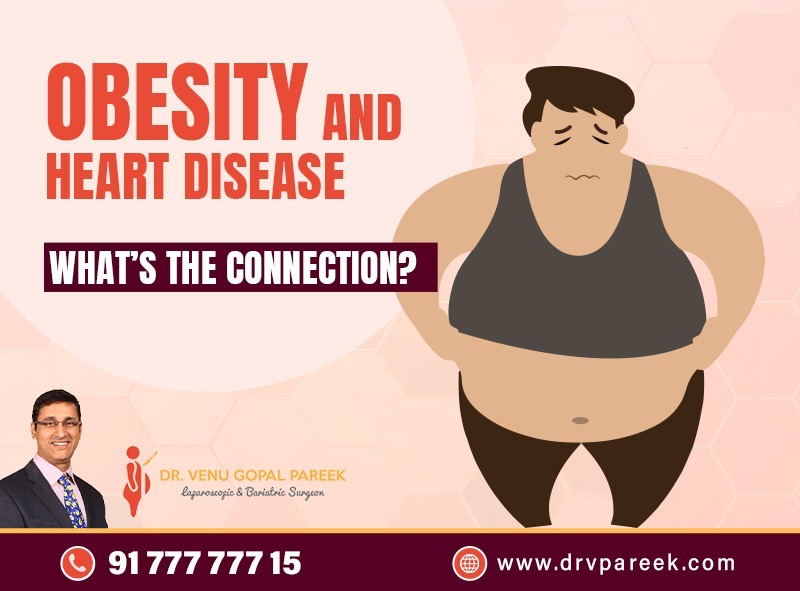
Obesity and Heart Disease: What’s the connection?
The outbreak of obesity has become widely known worldwide, with many nations having seen a rise in obesity rates since the 1980s. Obesity is a direct contributor to the development of many health conditions such as cardiovascular diseases, dyslipidemia, type 2 diabetes, hypertension, and sleep disorders. So, it is commonly accepted that being overweight can have a negative effect on one’s heart health. There is a significant amount of clinical evidence to support this claim.
For example, A study found that adults aged between 40-59 with overweight or obese are at increased risk (21-85%) of acquiring various cardiovascular diseases compared to people of normal weight. The research also indicates that individuals with obesity had a shorter lifespan.
Overweight is defined as having a body mass index (BMI) between 25 and 29.9, or obese with a BMI of 30 or higher. BMI is a measure of body fat based on height and weight. It is used to indicate if a person is at a healthy weight for their height. People with improper or higher BMI are at greater risk of developing cardiovascular disease even at a younger age.
The connection between heart disease and obesity is complex. Being obese can lead to the development of many other risk factors that can cause heart diseases, such as inflammatory processes that can damage your cardiovascular system and changes in the heart’s structure or function. Furthermore, obesity can cause further damage to the cardiovascular system. To learn more, read further.
How does obesity Increase your risk of developing heart disease?
The development of heart disease can be aggravated by obesity due to multiple factors.
First, having an excess of body weight can result in a buildup of fat in the arteries, leading them to become narrower and harder, a condition referred to as atherosclerosis. This can reduce the amount of blood flowing to the heart, thus increasing the chance of developing coronary artery disease, heart attack, and stroke.
Secondly, being overweight or obese can cause alterations in the structure and performance of the heart. The heart has to work harder to circulate blood around the body when one is overweight or obese. This can cause the heart to become enlarged, as well as other ailments such as heart failure.
Thirdly, obesity has been found to be correlated with other contributing factors to heart disease like metabolic syndrome a collection of heart-disease risk factors, including high blood pressure, high cholesterol levels, high triglyceride levels, and type 2 diabetes (high blood sugar levels). These issues can further increase the chances of developing heart disease.
Furthermore, obesity has been linked to the onset of sleep apnea, a condition marked by the interruption of breathing during your sleep. This can result in a decrease of oxygen in the blood and intensifies the possibilities of high blood pressure and heart disease. A large waist circumference i.e. 35 inches or more in women and 40 inches or more in men can also trigger risks of heart disease.
By keeping one’s weight in a healthy range through a combination of a nutritious diet and regular physical activity, the likelihood of getting heart disease or other related illnesses can be reduced.
How obesity compromises the ability of the heart’s function?
Some researchers say that obesity can put you at greater risk of developing atrial fibrillation, an abnormal and rapid heartbeat of the upper chambers of the heart that can cause blood clots, potentially leading to stroke, heart failure, or other cardiac problems, according to the American Heart Association. Additionally, obesity can cause enlargement of the heart, which could be due to untreated hypertension.
Here are some steps you can take to reduce your risk of heart disease if you are overweight or obese:
Adopt a healthy diet: In order to maintain a healthy weight and reduce your risk of heart disease, it is important to adopt a healthy diet. Focus on eating plenty of fruits, vegetables, whole grains, and lean proteins, while avoiding high-calorie, high-fat foods such as processed snacks, sugary drinks, and fried foods.
Get regular exercise: To stay healthy and reduce your risk of developing heart diseases, make sure to do regular exercise. Aim to do at least 150 minutes of moderate-intense aerobic activity every week, like brisk walking, biking, or swimming. These activities will help you burn calories and maintain a healthy weight.
Manage your weight: If you are overweight or obese, losing your weight is key to reducing your risk of heart disease. Even losing just 5-10% of your body weight can make a big difference in your overall health.
There are many different weight lose procedures at present and bariatric surgery is one of the finest option to lose those extra pounds of body weight effectively. It is usually used for those who are severely obese and have not been able to lose weight through diet and exercise alone. In addition to helping people lose weight, bariatric surgery can also reduce the risk of certain conditions associated with obesity, such as diabetes and heart disease.
Manage stress: Managing stress is an important step for improving your heart health. Practising relaxation techniques such as meditation, yoga, or exercise can help reduce stress levels and improve overall health. If you are struggling to manage your stress, seeking help from a mental health professional can be beneficial. They can help you identify the source of your stress and develop a plan to address it.
Quit smoking: If you’re a smoker, quitting is an important step to take in order to reduce your risk of developing heart disease. Smoking is a major cause of heart disease, so by quitting, you can drastically reduce your chances of developing this life-threatening condition.
Get regular check-ups: Make sure to get regular check-ups: A visit to the doctor on a regular basis can help detect any health issues early, such as high blood pressure, high cholesterol, or diabetes, all of which can lead to heart disease.
In conclusion, following above steps can help you to reduce your risk of heart disease, even if you are overweight or obese. It’s never too late to make positive changes for your health and wellbeing. For more detail information on a safe weight loss procedure consult Dr. V Pareek, one of the best weight loss surgeon in Hyderabad. He has immense experience and can certainly help you in losing weight. Call @91777 77715 or visit Appointment Booking.







